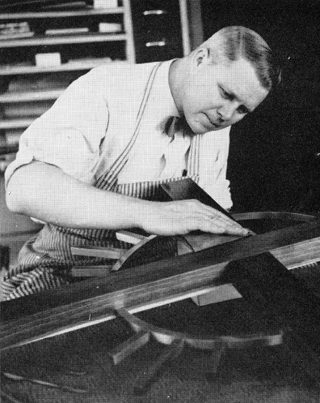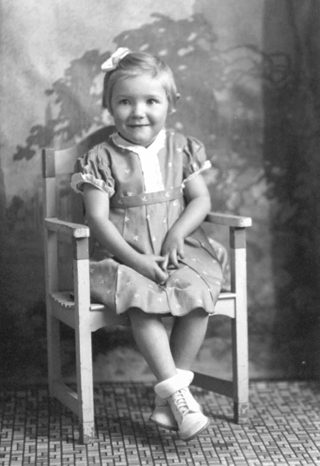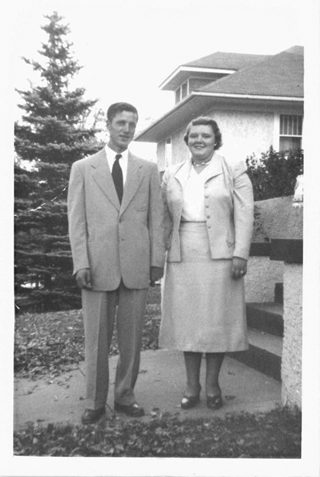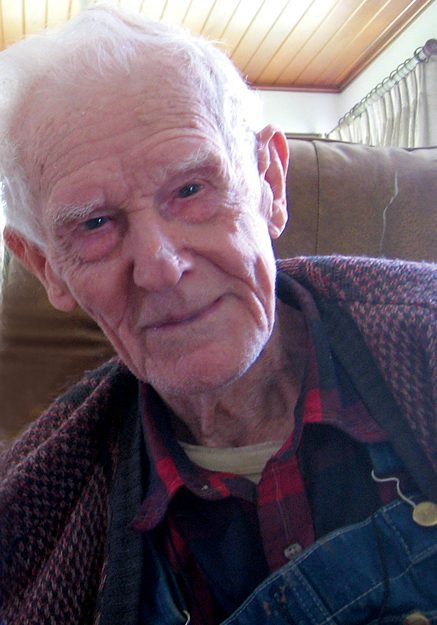 Interview and Introduction by Jen Johnson and Lor Miller – This probit originally appeared in the “Summer” 2012 issue of Inspire(d).
Interview and Introduction by Jen Johnson and Lor Miller – This probit originally appeared in the “Summer” 2012 issue of Inspire(d).
At the age of 99, William (Bill) Beard still resides on the land where he grew up in Decorah and takes comfort in the home he and a nephew built for his family – wife Betty and daughter Grace. With his wife and all of his siblings now deceased, Bill and his sister-in-law Laura call each other every morning to make sure they made it through the night all right. It’s something he looks forward to, and this daily routine of family taking care of family has always been a part of his life. His grandfather lived with him growing up, along with one of his aunts, so there was always family around. Bill peels his potatoes for dinner, bakes a cake for dessert, and likes to eat it with ice cream every night! He is a sport of a fellow, enjoys watching the birds outside his windows, and is always up for a game of checkers or cards with the kids. Listening about their lives, activities, or jokes, he’s always a dear to tell us some of his memories too.
What’s the best advice anyone ever gave you?
Always tell the truth.
And advice you might offer to us?
Keep your head to the game and stay on top of things. (If Bill sees something that needs to be done, he does it! He always had chores to do at home and he feels that kids should have chores to help them learn to take responsibility for things.) Don’t live beyond your means. If you don’t have the money for something, you simply shouldn’t buy it.
What did you want to be when you grew up?
I always wanted to be a farmer. My dad and grandfather were both farmers. It was fun to work with the baby animals when they were first born. As a boy, I took care of the sheep. At 2:00 in the morning, I’d get dressed, give them some milk and bring them into the kitchen for the night if it was too cold outside. We’d put wood in the kitchen stove to keep them warm and dry. But they weren’t used to the linoleum floor and they’d fall down! As a farmer, you worked hard and then played hard. (Bill said he used to just dream of Sundays. They would take the day off from farm work and go to church while his mom or Aunt Bess would stay home and cook. After church, they would pack a big picnic and head off to find a good spot by the creek. After eating well, they took off their shoes to play in the creek or just lie down on the grass and enjoy it.)
What did you do?
I was a farmer. We had animals, corn, oats, barley, and hay. You do everything that needs to be done. One of the benefits about being a farmer is directly benefiting from the work you put in. Dreaming of a warm fire in winter was motivation to cut and chop wood, just as pulling a roast out of the freezer for a meal was motivation to care well for the animals you raised. You take care of the animals, and they’ll take care of you. You knew that if you didn’t do the work involved, you would lose out on some of the most enjoyable moments. (We commented to Bill that it sounded like despite all the hard work, his life was good. He smiled and said, “Well, it did have its not so good times as well. But there’s no use dwelling on the bad parts. People have enough troubles as it is, so you need to remember the good parts.” We think this attribute of counting his blessings is a large part of what keeps Bill so happy and healthy.)
If you were stranded on a desert island, what three things would you want with you?
With a chuckle, Bill says with practicality, “Something to drink, a pillow and some covers, and something to eat.” Name one thing you could not live without. (Again, the realist) “water.”
If you could eat anything for the rest of your life, what would it be?
Potatoes and gravy, some kind of hamburger, most any kind of fruit, and for dessert, ice cream.
Tell us about (meeting your wife and) your wedding day…
The pastor at the church had set up a night of games for the single boys and single girls. Betty was a good church woman, and I thought I could probably get along with her. She was a teacher and was due to go back home at the end of the school year. I asked her if she ever thought about marriage, and she said, why yes, she did. The wedding was the first day of September. She lived down in Burlington, and I had driven down the day before. Some of the family had to stay home to do chores, so it was her family plus my mother and father. After the wedding, Betty and I started off on our honeymoon. We were driving around the state and up into Minnesota. We got to Minneapolis and decided that was too big a town for us — we got out quick! So Decorah it remains yet today.
 Orginally published in the Oct/Nov 2009 Inspire(d) Magazine • Photo courtesy Luther College Archives
Orginally published in the Oct/Nov 2009 Inspire(d) Magazine • Photo courtesy Luther College Archives




 What was the best advice you were ever given?
What was the best advice you were ever given? Interview and Introduction by Jen Johnson and Lor Miller – This probit originally appeared in the
Interview and Introduction by Jen Johnson and Lor Miller – This probit originally appeared in the 

